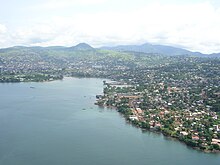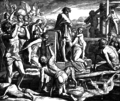Portal:Cities
The Cities Portal

A city is a human settlement of a notable size. The term "city" has different meanings around the world and in some places the settlement can be very small. Even where the term is limited to larger settlements, there is no universally agreed definition of the lower boundary for their size. In a more narrow sense, a city can be defined as a permanent and densely settled place with administratively defined boundaries whose members work primarily on non-agricultural tasks. Cities generally have extensive systems for housing, transportation, sanitation, utilities, land use, production of goods, and communication. Their density facilitates interaction between people, government organizations, and businesses, sometimes benefiting different parties in the process, such as improving the efficiency of goods and service distribution.
Historically, city dwellers have been a small proportion of humanity overall, but following two centuries of unprecedented and rapid urbanization, more than half of the world population now lives in cities, which has had profound consequences for global sustainability. Present-day cities usually form the core of larger metropolitan areas and urban areas—creating numerous commuters traveling toward city centres for employment, entertainment, and education. However, in a world of intensifying globalization, all cities are to varying degrees also connected globally beyond these regions. This increased influence means that cities also have significant influences on global issues, such as sustainable development, climate change, and global health. Because of these major influences on global issues, the international community has prioritized investment in sustainable cities through Sustainable Development Goal 11. Due to the efficiency of transportation and the smaller land consumption, dense cities hold the potential to have a smaller ecological footprint per inhabitant than more sparsely populated areas. Therefore, compact cities are often referred to as a crucial element in fighting climate change. However, this concentration can also have significant negative consequences, such as forming urban heat islands, concentrating pollution, and stressing water supplies and other resources. (Full article...)
Selected city -

Freetown is the capital and largest city of Sierra Leone. It is a major port city on the Atlantic Ocean and is located in the Western Area of the country. Freetown is Sierra Leone's major urban, economic, financial, cultural, educational and political centre, as it is the seat of the Government of Sierra Leone. The population of Freetown was 1,055,964 at the 2015 census.
The city's economy revolves largely around its harbour, which occupies a part of the estuary of the Sierra Leone River in one of the world's largest natural deep water harbours. (Full article...)Did you know -
- ... that King Hussein of Jordan gifted an ancient Roman column to New York City for the 1964–65 World's Fair?
- ... that the African Union has set up a space agency in a Space City?
- ... that the Andrew Carnegie Mansion in New York City was designed by "the only architects in the city who had not begged for the job"?
- ... that the wooden houses at 312 and 314 East 53rd Street were completed just as fire codes in New York City prevented the construction of further wooden structures nearby?
- ... that Wie liegt die Stadt so wüst (How Deserted Lies the City), a motet composed by Rudolf Mauersberger after the bombing of Dresden, was first performed in the destroyed Kreuzkirche?
- ... that Huntsville, Alabama, is nicknamed Rocket City?
Related portals
Related WikiProjects

Plymouth (/ˈplɪməθ/ PLI-məth) is a port city and unitary authority in Devon, South West England. It is located on Devon's south coast between the rivers Plym and Tamar, about 36 miles (58 km) southwest of Exeter and 193 miles (311 km) southwest of London. It is the most populous city south of London.
Plymouth's history extends back to the Bronze Age, evolving from a trading post at Mount Batten into the thriving market town of Sutton, which was formally re-named as Plymouth in 1439 when it was made a borough. The settlement has played a significant role in English history, notably in 1588 when an English fleet based here defeated the Spanish Armada, and in 1620 as the departure point for the Pilgrim Fathers to the New World. During the English Civil War, the town was held by the Parliamentarians and was besieged between 1642 and 1646. In 1690 a dockyard was established on the River Tamar for the Royal Navy and Plymouth grew as a commercial shipping port throughout the Industrial Revolution. (Full article...)Selected article -

A metropolis (/mɪˈtrɒpəlɪs/) is a large city or conurbation which is a significant economic, political, and cultural area for a country or region, and an important hub for regional or international connections, commerce, and communications.
A big city belonging to a larger urban agglomeration, but which is not the core of that agglomeration, is not generally considered a metropolis but a part of it. The plural of the word is metropolises, although the Latin plural is metropoles, from the Greek metropoleis (μητρoπόλεις). (Full article...)General images -
Topics
List articles
Subcategories
Associated Wikimedia
The following Wikimedia Foundation sister projects provide more on this subject:
-
Commons
Free media repository -
Wikibooks
Free textbooks and manuals -
Wikidata
Free knowledge base -
Wikinews
Free-content news -
Wikiquote
Collection of quotations -
Wikisource
Free-content library -
Wikiversity
Free learning tools -
Wiktionary
Dictionary and thesaurus







































